
 |
|
|
#1 |
|
Member
Join Date: Dec 2004
Location: What is still UK
Posts: 5,807
|
In this bicentennial year of William Wilberforce and the great act for mankind he got through parliament. I think this is rather important to all interested in African arms. These pictures are of what is listed as food paddles from runaway slaves that formed there own tribes known in the past as Bush Negroes from Surinam. They are remarkably similar to central African and Congo blades. The book Bush Negro Art, Philip J C Dark was published 1973. They could be clubs? It would not be the first time that a book in the recent pasted has got it all wrong? You have to admit the link is undeniable.
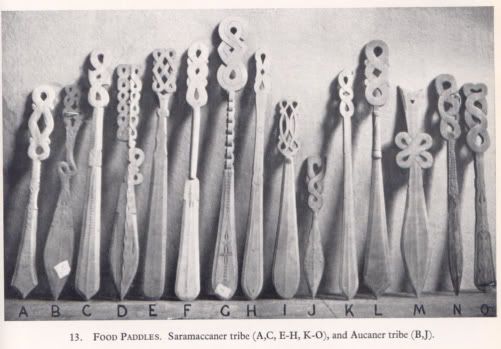 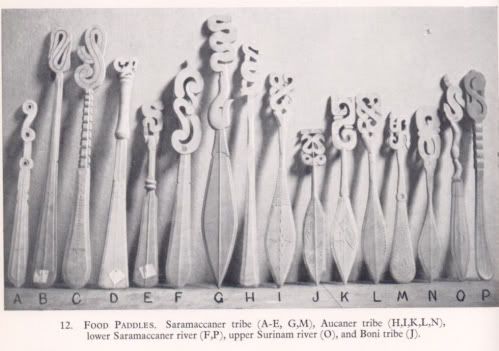 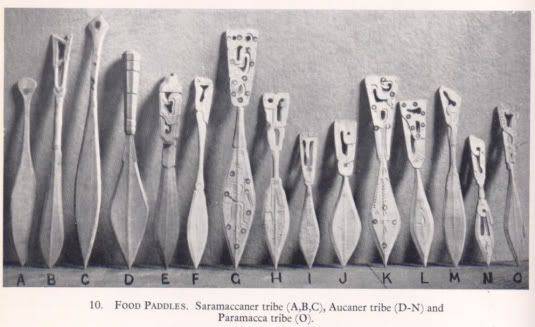 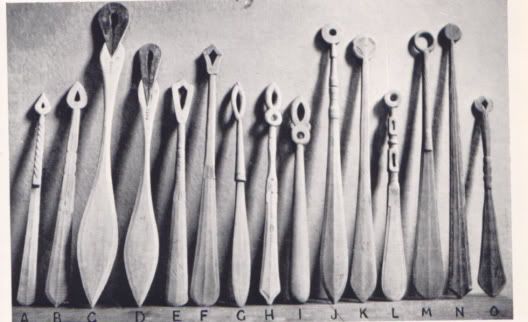
Last edited by Tim Simmons; 21st March 2007 at 10:53 PM. |
|
|

|
|
|
#2 |
|
Member
Join Date: Dec 2004
Posts: 987
|
They do look like clubs. What would a food paddle be, in any case? They don't seem to be stained from stirring, or scortched from oven use (they don't even look think enough to work for putting things in and out of an over).
Could this be a case of a "cover story" by the makers to divert attention from the fact that they were weapons? |
|
|

|
|
|
#3 |
|
Member
Join Date: Dec 2004
Location: What is still UK
Posts: 5,807
|
There is no info on exactlly why and how they were used. The largest one in the top pic is 23 1/4 inches the largest of all is 25 inches. Which is along the same lines as the knives in Africa. They could also be clubs but many do not seem the most functionable.
|
|
|

|
|
|
#4 |
|
Arms Historian
Join Date: Dec 2004
Location: Route 66
Posts: 9,948
|
I noticed this post and was intrigued by the topic, so thought I would look into this a little further. There seems to have been a great deal of very much overlooked history on the subject of runaway slaves in so many regions of the Americas. Apparantly the tribes of these unfortunate victims of slavery that founded colonies in Surinam, a coastal region of South America above Brazil, were descendants of slaves held by Dutch colonial traders.
The use of paddles in the preparation of food in volume, such as gumbos, mush etc. seems well known among tribal peoples, and these implements are noted in numerous instances as far as the tribes in NW America. It is noted as well that the tribes of Seminole of Florida, which include descendants of runaway slaves, use trunks of the sabal palmetto for fashioning food paddles, as well as staffs and arrows. It is interesting to note the association of the same wood for weapons as for a food implement, considering that here we are wondering if a household cooking item might be used as a weapon. Naturally, we are all aware of the standard 'weapon of opportunity' , and that most implements can be used as a weapon in one way or another. Burton, in his "Book of the Sword" (1884, p.42) notes that, "...the passage of the paddle into the sword is well known amongst the wilder 'Indians' of the Brazil". He notes further that the Brazilian instrument known as the Macana (in some regions 'tamarana') retains the form of the original paddle, while for offensive purposes the oval head is sharpened all around. In parts of Brazil , he notes that the macana was a rounded club, and that the sharpened version was termed a 'pagaye'. It would seem that these domestically oriented paddles, having been in many instances altered by sharpening as noted for 'offensive purposes', might have gained a certain ceremonial or traditional stature by association with warfare related events, and that appropriately decorative examples may have become traditionally or patriotically symbolic. Possibly these apparantly unused, unstained examples may have been of that instance. Clearly these items were 'multipurpose' in nature, and on a less serious note,I can't resist thinking of the old cliche' cartoon image of the enraged wife after her husband waving a rolling pin!  Best regards, Jim |
|
|

|
|
|
#5 |
|
Member
Join Date: Dec 2004
Location: What is still UK
Posts: 5,807
|
Great addition Jim. In the description of the paddles mention is made of a median ridge to add strength which does seem to suggest many have some weight and a varied function most likely. It is the similarity to African blades that is so interesting. The overall shapes, the topography, median ridge and tips we have all seen before many threads on African arms. The actual canoe paddles are more noticeably paddles and of the most exquisite carving.
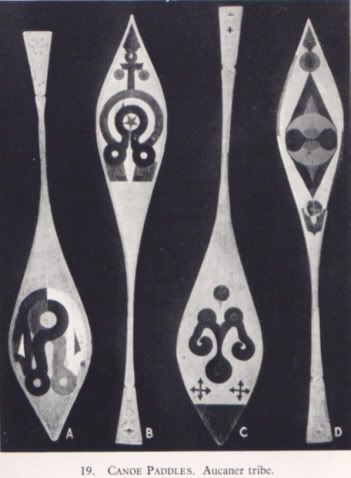 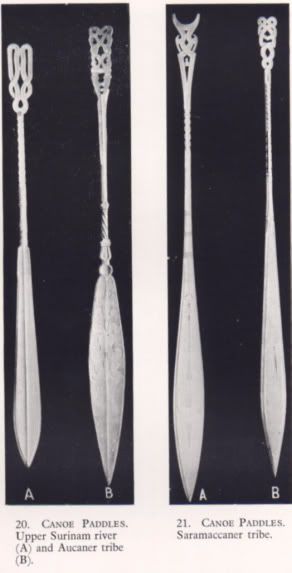 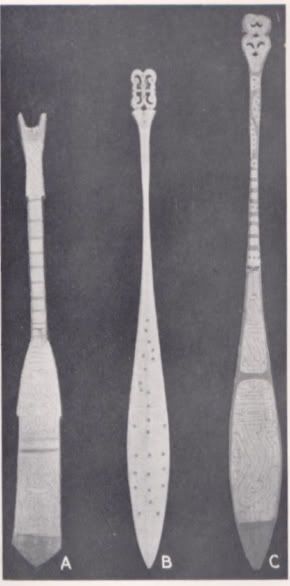 Wonderful mix of Amerindian and African. Last edited by Tim Simmons; 24th March 2007 at 12:13 PM. |
|
|

|
|
|
#6 |
|
Member
Join Date: Dec 2004
Location: Houston, TX, USA
Posts: 1,254
|
Remember that certain types of swords traditionally serve as rank markers in Bantu (etc.) society.
|
|
|

|
|
|
#7 |
|
Member
Join Date: Dec 2004
Location: What is still UK
Posts: 5,807
|
Very good point Tom. These could be in that tradition and a substitute for iron which would only be available from your previous masters community. The painted paddles have what looks like some Voodoo iconography. I do not think Voodoo as such if called Voodoo in South America?
Last edited by Tim Simmons; 1st April 2007 at 01:38 PM. |
|
|

|
 |
|
|